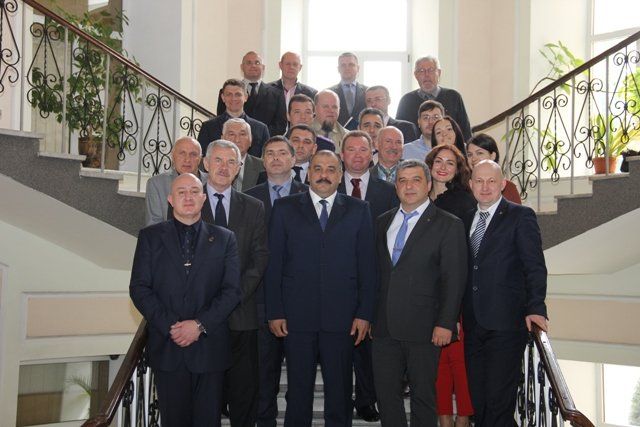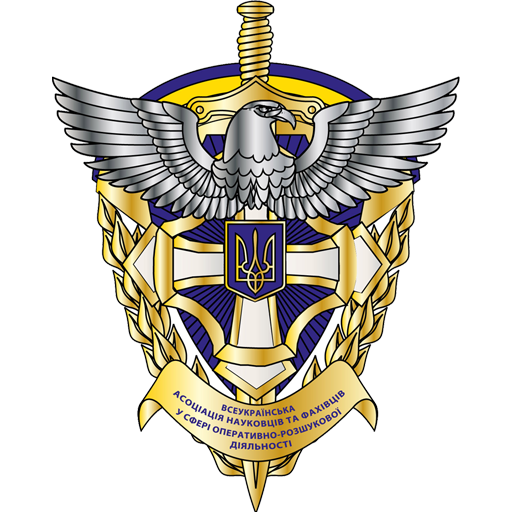
CRIMINAL INTELLIGENCE: THEORY AND PRACTICE
On April 29, 2016, the Odessa State University of Internal Affairs, at the initiative of the All-Ukrainian Association of Scientists and Specialists in the Field of Operational and Investigative Activities, hosted the International Scientific and Practical Conference “Criminal Intelligence: Methodology, Legislation, Foreign Experience” and a regular meeting of the Association’s Board.
At the beginning of the conference, the Chairman of the Association, Doctor of Law, Professor Oleksandr Korystin, noted that the criminogenic situation in modern Ukraine is characterized by an unusually large number of criminal manifestations, which are caused by permanent political instability, the destruction of established economic ties, the decline in the level of people’s well-being, and the necessity of conducting hostilities in the east of our country. In recent years, the number of criminal groups that are well-organized and use the latest methods of committing property and violent crimes, firearms, explosive devices, special technical and other means to counteract law enforcement agencies in their illegal activities has significantly increased.

Effective counteraction to crime, primarily in its most dangerous organized forms, is impossible without awareness of the processes taking place in the criminal environment, without the ability to influence them with a preventive purpose, without careful clandestine documentation of the facts of illegal activity. Law enforcement agencies of Ukraine must have up-to-date information about the conditions for the formation and functioning of organized criminal groups; the mechanisms by which they commit crimes; the role of each member of the criminal group in this; the movement of shadow and other financial flows that enable the existence of these groups or are the subject of their criminal interests; the infrastructure of organized crime, as well as other information necessary for organizing effective counteraction to crime in Ukraine.
Receiving, extracting, documenting, analytical processing, systematizing and storing information of a criminogenic nature, as well as forecasting the development of events and identifying existing risks, should be handled by specialized units of law enforcement agencies, taking into account the specific conditions of this work, associated with complete secrecy, increased danger to personnel, and the need for special professional training. Police practice in most developed countries and the positive experience of law enforcement agencies in Ukraine indicate that it is advisable to assign these functions to criminal intelligence units, whose activities should be secret.
The urgent need for effective counteraction to organized crime, while respecting the constitutional rights and freedoms of man and citizen, as well as the existing experience of the criminal intelligence units of the Ministry of Internal Affairs of Ukraine, including negative ones, should be used as the basis for a scientific discussion of the problems of regulatory, organizational, methodological, tactical, technical and information support for the work of criminal intelligence units in our country in the context of the development of the global market economy and modern migration processes.
The international scientific and practical conference was held with the assistance of the Prague Institute for Security Studies (Czech Republic) and the Center for European Reform Studies (Grand Duchy of Luxembourg).

The conference was attended by 116 participants from 9 regions of Ukraine: Vinnytsia, Dnipropetrovsk, Kyiv, Lviv, Luhansk, Mykolaiv, Odessa, Kharkiv, Kherson. Representatives of scientific institutions and educational institutions of the Duchy of Luxembourg, the Czech Republic, and the Republic of Moldova also took part in the conference.

During the conference, 98 reports were heard and discussed, covering a wide range of criminal intelligence issues.

According to the program and registration data, 116 participants took part in the conference, including: 18 doctors of sciences, 52 candidates of sciences, 21 employees of practical departments, 16 associate professors and postgraduate students, 13 cadets and students.
Sectional meetings were divided into research areas, in accordance with the issues of the conference:
— “Problematic issues of the formation of the categorical apparatus and methodology of criminal intelligence”;
— “The relationship between operational and investigative activities and criminal intelligence: theory and practice”;
— “Criminal intelligence in the field of protecting the economic security of the state”;
— “Prospects for the use of criminal intelligence in criminal proceedings”.
The scientific results of the conference were summarized at the final meeting with the participation of members of the Board of the Association.
CONFERENCE RECOMMENDATIONS
Given the urgent need of society for a comprehensive renewal of law enforcement activities and the formation of a proactive model of police activities based on the use of methods and means of criminal intelligence, the participants of the international scientific and practical conference consider it necessary:
1. In the field of scientific and research activities:
In order to conceptually rethink and scientifically study the theoretical and applied problems of implementing the intelligence function of operational and investigative activities, we consider it necessary to carry out the following set of scientific research aimed at:
1.1. Determining the genesis and historical patterns of the formation of the "theory of criminal intelligence" as a private theory of operational and investigative activities, with the definition of its system of object, subject, structure, functions and methodological basis: scientific tools, theoretical categories, language, system of principles.
1.2. Identification of problems and directions for defining and forming a paradigm-concept – strategy and tactics of criminal intelligence.
1.3. Substantiation of theoretical, legal, scientific, moral, ethical and psychological foundations of criminal intelligence.
1.4. Study of positive experience of intelligence activities of law enforcement agencies of developed countries of the world in order to introduce modern innovations to increase the efficiency of criminal intelligence, use of modern intelligence methods and means, observance of human and citizen rights and freedoms.
1.5. Development of organizational, tactical and methodological principles for criminal intelligence at the current stage of development of Ukrainian society.
2. Organizational measures:
2.1. To create a flexible system of coordination and interaction between the National Police, the Security Service of Ukraine, the State Security Service, the Directorate of the Ministry of Internal Affairs of Ukraine, financial investigation units of the State Fiscal Service, and other law enforcement agencies with the aim of exchanging intelligence information to solve criminal intelligence tasks, to substantiate and determine the possibility of introducing coordinating structures (officers, liaison groups) in law enforcement agencies in the areas of criminal intelligence.
2.2. In order to improve the information and analytical support of criminal intelligence of the National Police, to scientifically substantiate and develop, based on innovative approaches to the use of modern information and telecommunication technologies, methodological recommendations for the reorientation of information and reference work into intelligence and analytical work in order to predict trends in the criminalization of society, assess risks, the degree of danger and the scale at the regional, national and international levels, as well as reduce the level of latency of crimes.
2.3. To create new or improve existing electronic information and search systems and software for searching for intelligence information in the areas of criminal intelligence.
2.4. In order to train highly qualified specialists in the field of criminal intelligence, to develop and introduce into the educational process of universities with special training conditions of the Ministry of Internal Affairs of Ukraine the following academic disciplines: "Criminal Analysis (Criminal Intelligence)", "Fundamentals of Operational and Technical Documentation", "Fundamentals of Computer Intelligence", "Analytical Work in ORD".
2.5. To form a modern methodological base of criminal intelligence, create an interdepartmental creative team to prepare methodological recommendations and reference publications on the implementation of intelligence and search activities by units of the National Police, to form information bases with the possibility of their use for the preparation of analytical reviews and criminal intelligence materials during the formation of strategies for combating crime, as well as for solving the tasks of specific criminal proceedings.
2.6. Based on the study of the best experience of police intelligence activities of law enforcement and special agencies of foreign countries, recognize the need to develop indicators (indices) of the effectiveness of the activities of operational units in terms of the implementation of the intelligence function.
2.7. Recommend the reports of the participants of the International Scientific and Practical Conference "Criminal Intelligence: Methodology, Legislation, Foreign Experience" for publication in a separate collection of materials.
3. In the legislative sphere:
In order to bring the current legislation, departmental regulatory legal acts in the field of criminal intelligence into line with world standards for ensuring human rights and freedoms, scientists and specialists must:
3.1. Based on the rethinking and scientific study of the implementation of the intelligence function of the ORD, make proposals for amendments and additions to the Law of Ukraine “On Operational and Investigative Activities” and departmental regulatory legal acts regulating the activities of operational units.
Based on the materials of the international scientific and practical conference “Criminal Intelligence: Methodology, Legislation, Foreign Experience”, a collection of abstracts was published, which highlights the results of scientific research by the participants of this event. The participants of the conference received the corresponding certificates.

